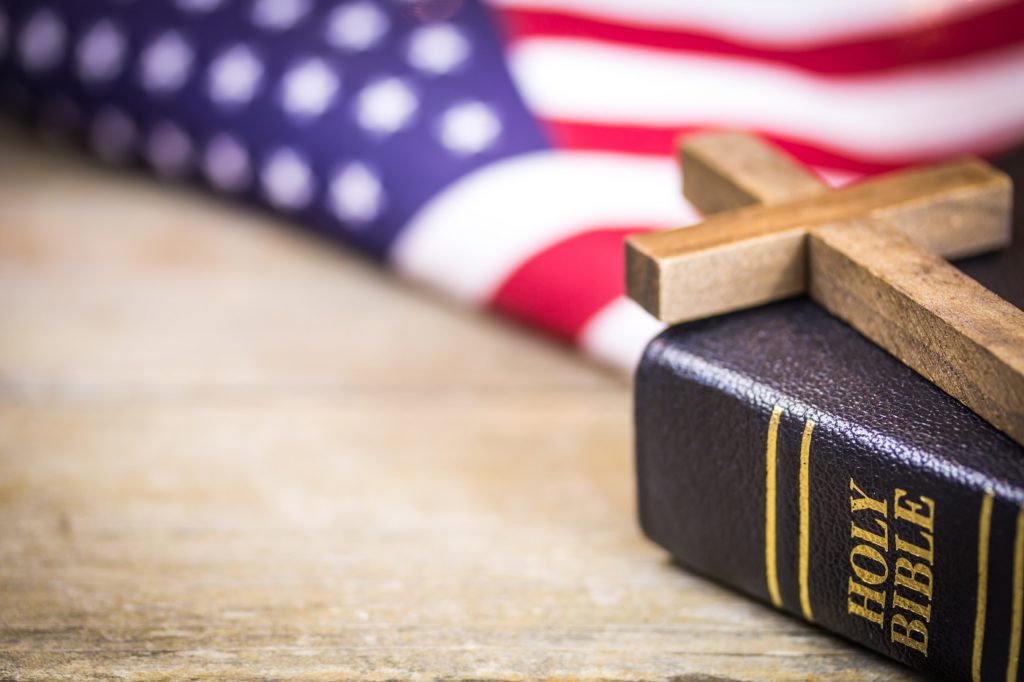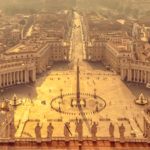Recently, John Ehrett wrote a thoughtful review of Andrew Walker’s new book Liberty for All: Defending Everyone’s Religious Freedom in a Pluralistic Age. In his review, Ehrett claimed that Walker exhibits a sort of “Baptist un-self-consciousness,” which he further suggests is characteristic of Baptist writings on religious liberty. This is a puzzling claim, since Walker’s confessional commitments are clear throughout the text and further expounded in the book’s appendix. It is no doubt true that Walker reinforces the instincts of many evangelicals in a post-denominational age, but this approach doesn’t mean Walker is un-self-conscious of his own Baptist-ness. On the contrary, it demonstrates that he is quite conscious of what church historian Martin Marty once described as the “Baptistification” of American Protestantism.
According to Marty, many historically low church and free church sensibilities had become baseline assumptions among many Protestants by the early 1980s. This was even true among some Protestants who affirm infant baptism. Baptistification is even more prevalent a generation later. One need only observe the proliferation of nondenominational and/or charismatic churches that might be called baptistic or baptish in their outlook to see the enduring merits of Marty’s observation.
Taken as a whole, Liberty for All is both a Baptist theological case for religious liberty and an effort to form baptistic convictions among evangelicals who eschew the Baptist (and perhaps any denominational) label.
The fact is, a commitment to religious liberty for all has characterized the Baptist movement from its beginning.
Start your day with Public Discourse
Sign up and get our daily essays sent straight to your inbox.A Historical Commitment to Religious Liberty
The fact is, a commitment to religious liberty for all has characterized the Baptist movement from its beginning. A number of early Baptist leaders in both the British Isles and North America made the case for religious liberty. Seventeenth-century London Baptist pastors Thomas Helwys and Leonard Busher, as well as Rhode Island founder and sometime Baptist minister Roger Williams, offered arguments for religious liberty that predated the more famous works of Thomas Hobbes and John Locke on religious toleration. In the revolutionary and early republican periods, Isaac Backus and John Leland were pastoral contemporaries of Thomas Jefferson and James Madison who encouraged American Baptists to ally with the latter because of their advocacy of church-state separation and a constitutional right to religious liberty.
Though these Baptist thinkers disagreed among themselves on finer points, there was consensus around three basic premises. First, God alone is Lord of the conscience, and each individual will give an account before God at the end of the age. Second, the state possesses no divine authority to coerce religious belief, punish unbelief, or determine matters of orthodoxy or heresy. Finally, a formal separation of church and state is the best arrangement to ensure the religious liberty of all people.
These views proved consonant with the emerging liberal consensus represented by the Enlightenment and enshrined in the First Amendment. Even today, Baptists around the world advocate these principles, whether they are free citizens of liberal nations that adhere to church-state separation or oppressed minorities struggling to worship freely under coercive regimes committed to atheism or some form of theocracy.
While religious liberty has remained a hallmark Baptist commitment, most Baptists have been content to cite the aforementioned pioneering thinkers, echo Enlightenment reflections that are conducive with a Baptist perspective, and proof-text a couple of key passages from Scripture: the parable of the wheat and tares (Matt. 13:24-30) and Jesus’s teachings on the coin bearing Caesar’s image (Matt. 22:15-22). This is one reason why Liberty for All is such a helpful book. In it, Walker offers a much more fully developed Baptist public theology of religious liberty. He correctly notes that religious liberty encompasses more than just church-state relations, though he argues religious liberty is “revelatory and presuppositional” in understanding how religion and politics relate to one another in a given context.
A Biblical Theology of Religious Liberty
Walker structures his book around reflective engagement with three key theological themes: eschatology (the kingdom of God), anthropology (man as the image of God), and missiology (the mission of God). Though each theme is given a section with two focused chapters, they also “cross-pollinate” the various chapters. As the book progresses, Walker develops a biblical theology of religious liberty rooted in worship and ethics rather than a philosophical theory of natural rights.
Jesus Christ is Lord of all, though his kingdom is realized gradually in the lives of believers until the climax of his second coming. Until that time, the roles of Christ’s kingdom and earthly governments remain formally separate. Walker does not suggest that earthly rulers should be irreligious, but rather that the state should be non-confessional, since the purposes of the state are not the purposes of the kingdom. Drawing on insights from theologians David VanDrunen and Jonathan Leeman, Walker argues that the Noahic covenant calls for us to pursue human flourishing in a world where sin, including various forms of idolatry, remains normative. This Christian understanding of secularism affirms that religious liberty is a common-grace gift in the midst of religious diversity that allows space for authentic religion to be practiced and to be active in the public square.
A Christian account of religious liberty is properly rooted in the imago Dei. Human personhood entails moral reasoning, conscience, and freedom. Furthermore, humans are inherently religious and will ultimately gravitate to either authentic worship of the true God or disordered worship of an infinite variety of idols. For Christians, religious liberty is a human right that is rooted in God’s design for his human creatures rather than Enlightenment philosophical reflection.
Walker argues that religious liberty is an “interim ethic” that creates space for God’s kingdom to advance. It ensures the right of Christians to proclaim God’s saving work through Christ, and it allows for unbelievers to freely embrace this message without coercion from a theocratic state. The Lord will sort out true and false belief at the end of the age. During this time between the times of Christ’s first and second comings, religious liberty enables all individuals to follow their religious sensibilities.
A Commitment to Liberal Democracy
In addition to his Baptist convictions, an additional assumption underlies Walker’s project that is more fully developed in the book’s epilogue. Walker believes liberal democracy provides the best framework for a Christian understanding of religious liberty to thrive. This perspective situates Walker more on the side of David French rather than Sohrab Ahmari in their much-discussed debate over the virtues of classical liberalism versus national conservatism. However, Walker’s commitment to liberal democracy as the ideal form of government on this side of the eschaton is born of his deeply Baptist sensibilities about religious liberty rather than a partisan commitment to contemporary debates about the future of American conservatism.
Walker’s commitment to liberal democracy echoes the historic consensus among Baptists in America prior to the rise of the Religious Right. In the Reagan era, political and religious leaders popularized a soft (i.e. non-theocratic) form of Christian nationalism among millions of evangelicals, including many theologically and politically conservative Baptists. Whereas most earlier Baptists had argued for a position similar to Walker’s Christian secularism, since the 1970s, it has been increasingly common for Baptists and other evangelicals to argue that America was founded as a Christian nation. In this view, the separation of church and state is at worst a myth and at best simply about the disestablishment of a state church.
Walker clearly affirms the influence of Christianity on the Founding Fathers and the ongoing positive role of biblical religion in society, but he rejects Christian nationalism in favor of thoughtful Christian engagement in a pluralistic public square.
No Mere Quietism
Some readers, especially from traditions that have been less committed historically to religious liberty or who are drawn to various forms of Christian nationalism, may think that Walker is calling for some sort of quietism when it comes to Christian political engagement. Not only would this constitute a misunderstanding of Walker’s position, it belies his own experience in public policy at the Heritage Foundation and the Southern Baptist Ethics and Religious Liberty Commission.
In contrast with many of his fellow millennials, Walker argues against any sort of pietistic withdrawal from political engagement because of some perceived sense of political homelessness. While Christians are politically homeless in the ultimate sense because we are citizens of Christ’s kingdom, in the very real but penultimate sense, we are also citizens of particular earthly kingdoms. This is not a uniquely Baptist insight, but rather is a catholic principle that is rooted in Augustine’s doctrine of the two cities and how believers ought to relate to each.
Liberty for All is an important work of moral theology that accomplishes Walker’s primary goal of offering a distinctively Christian account of religious liberty from a convictionally Baptist perspective. His work should encourage Baptist and other evangelical pastors and theologians who rightly believe that religious liberty is threatened by anti-Christian secularism and various forms of illiberalism on the progressive left and populist right.
Liberty for All provides biblical-theological resources for navigating an increasingly anti-Christian culture in the West, especially the United States. Baptists have been here before, prior to the Act of Toleration in England and the First Amendment to the US Constitution. (Not to mention the pre-Constantinian Christians of Europe.) They flourished in the midst of hostility as a counterculture for the common good. We can too.














